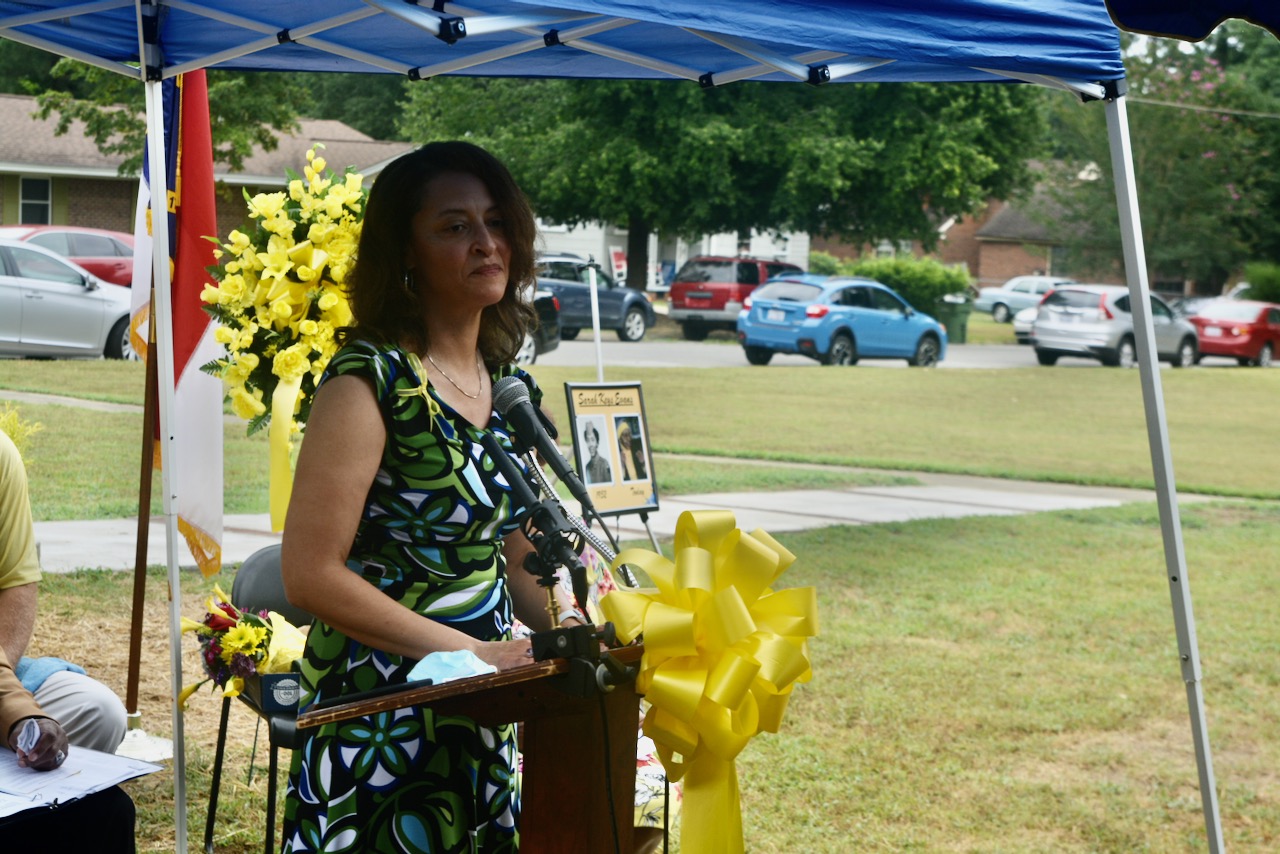Julie Graves choked back tears as she read a statement by her aunt — Sarah Keys Evans — at a ceremony Saturday marking the opening of a plaza named in honor of Evans.
Quoting her aunt, Graves said, “This mural is a splendid idea. It’s to represent the truth of my journey, not a fiction of it. I feel that each generation should have a view of the past — the good, the bad and the indifferent. I hope this mural will represent just that. It is a great honor to have this mural in Martin Luther King Jr. Park.”
In her personal comments at the park at the intersection of Wyche Street and Virginia Avenue, Graves said, “I’m so grateful for all of your hard work. This just touched my heart when I heard it was going to happen. It is Mrs. Evans and my family’s hope that this mural will educate present and future generations about Sarah Keys Evans and the events that occurred roughly 70 years ago.”
Graves said, “We also hope it will uplift and empower future generations and help them recognize and remember her as one of the many trailblazers that took a stand against injustice. Let us recognize the significance of this mural not simply because this event occurred but because it holds continued relevance.”
Via Zoom, Keys-Evans, the woman who refused to give up her seat to a white Marine during a stop in Roanoke Rapids, said, “This is a glorious day for me. This dedication and celebration makes me very, very happy. I believe we all have a kinship. I wish I could have been there in person but from what I’ve heard it is marvelous and I am very, very happy and very proud of everyone.”
While she said she probably couldn’t remember the names of all who spoke, she said, “I am very happy I’m being honored there today.”
Napoleon Hill, the Halifax County artist who has created many murals throughout the region, and did the panels for the Sarah Keys Evans Plaza commemorating her fight before the Interstate Commerce Commission, said, “This day is long overdue. Thank you Ms. Evans. Thank you, thank you, thank you.”
Saluting sheer bravery
Ervin Griffin Sr., former Halifax Community College president and a member of the planning committee for the plaza said, “I think we can all agree that the life and contributions of Sarah Louise Keys Evans are too golden to ever forget. Today we are here as a testimonial to our honoree and friend — a testimony to bear witness to her contributions to the civil and human rights for all Americans.”
Griffin said the plaza honors someone “who has successfully bitten off more than the rest of us could chew or would chew. Some will say we are honoring accomplishments and others would say the essential element we are saluting is sheer bravery above and beyond the call of duty. We are not honoring the abstract idea. We are here to express our respect, appreciation and faith in an outstanding individual whom we call a trailblazer for justice.”
It was the Eastern Carolina Christian College & Seminary in Roanoke Rapids which submitted a grant proposal to the Z. Smith Reynolds Foundation for acceptance of the Keys plaza in its inclusive public art project.
Said Reverend Charles McCollum, chancellor and co-founder of the school, and the chair of the plaza project, “I wish to express my heartfelt gratitude for the rare opportunity to have served with the project committee, project partners, the city of Roanoke Rapids and others who contributed their service and support to help bring this priceless and worthwhile project to fruition.”
McCollum said, “Though the undertaking was somewhat challenging at times, I consider it a privilege to have shared in the meaningful experience of highlighting Mrs. Keys Evans’ compelling, unknown and often under-told story of justice and equality that forever changed the course of African-American history and world history.”
He said Keys-Evans took a bold stand for justice “in an era when it was not safe to do so — she already had two strikes against her. Her story speaks volumes in our present struggle for justice and equality … we are eternally grateful to Z. Smith Reynolds Foundation for the opportunity to serve as host and grant recipient for the Sarah Keys Evans Inclusive Public Art project entitled Closing the Circle.”
State and federal representatives
State Representative Michael Wray, who could not attend the event, sent a message to the audience which was read. “It is my pleasure to recognize and honor Mrs. Sarah Keys Evans for her contributions to American history and the civil rights movement.”
Her refusal to give up her seat on the interstate bus in Roanoke Rapids 68 years ago “was a courageous act of bravery that set the tone for the civil rights movement that lay ahead. Her persistence to fight for her rights resulted in the Interstate Commerce Commission ruling (and) prohibiting segregation on interstate busses. Mrs. Evans’ recognition is long overdue.”
United States Congressman G.K. Butterfield, who read into the Congressional Record Friday a resolution honoring Keys-Evans said, “What we celebrate here today is one example of a civil rights movement. It is so fitting you honor this great American, this great woman who continues to be with us today.”
Soon after President Harry Truman integrated the military in 1948 Keys-Evans joined. Two years before the NAACP filed what Butterfield called “a very significant federal lawsuit” challenging a Virginia state law that enforced segregation on busses in Virginia and interstate commerce. While the NAACP won it was never enforced.
In 1952 Keys-Evans was ordered to the back of a bus in Roanoke Rapids as she was on her way home to the North Carolina city of Washington. “That was a civil rights movement in itself,” Butterfield said. “That’s when she was urged to file a complaint with the Interstate Commerce Commission.”
In 1955 the ICC ruled the law which was not being forced in Virginia was valid law. “One week later that’s when Rosa Parks in Montgomery, Alabama, took a clue from Sarah Louise Keys and she too refused. That gave birth to Martin Luther King Jr. to head up the Montgomery bus boycott. Rosa Parks got the energy and the will with what she did partly because of what happened here in Roanoke Rapids. That just catapulted Martin Luther King Jr. to the national stage,” the congressman said.
The act by Keys-Evans was not done in a vacuum, he said. “It was all interconnected. It must be said that Sarah Louise Keys Evans was very much a part of that history. You are commended for recognizing her today.”
State Senator Milton Toby Fitch could not attend the event but his message of a state proclamation honoring Keys-Evans was read. “Her act of courage prompted the landmark Keys versus Carolina Coach Company — the resulting breakthrough civil rights case in which the Interstate Commerce Commission broke with its history of the … separate but equal doctrine.”
Local officials
Halifax County Board of Commissioners Chairman Vernon Bryant presented a resolution proclaiming August 1 Sarah Louise Keys Evans Day.
Because of her, Bryant said, people of color like himself, Roanoke Rapids Mayor Pro Tem Carl Ferebee and Littleton Town Commissioner Ophelia Gould-Faison and even his wife, Sandra, now a member of Roanoke Rapids City Council, were able to attain those positions.
“She was aware that busses originating in the north did not make any changes and adhere to the local southern laws,” Bryant said. “She knew the law and knew the rules. She was held for 13 hours and issued a $25 fine. The NAACP took the case before the ICC. I very proudly stand before you to authorize today as Sarah Keys Evans Day.”
Roanoke Rapids Mayor Emery Doughtie said he was touched by her upbringing. “Reading that she grew up on a family farm in rural North Carolina I gather from my family coming from a rural family farm in Northampton County that farm life was a very close knit family.
“The scriptures were probably read quite a bit which also leads to a stronger family life. I know even at an early age having parents around to instill values and encouraging you to do things that this lady was able to do when she was in her 20s. That was a reflection of her upbringing.” Said Doughtie: “She should be very proud of that. Having those values instilled in her gave her the confidence to take advantage of an opportunity to go about making change. She knew the law but she did not try to take matters into her own hands and take care of them at that minute. She went home and her father encouraged her again and she was able to have a positive impact on something that could have been negative but was a national change for people.”
Z. Smith Reynolds Assistant Director Joy Vermillion Heinsohn said in a statement, “The Z. Smith Reynolds Foundation is proud to support this incredible story of Mrs. Keys Evans, a North Carolina heroine who paved the way for civil rights.”
Heinsohn said, “We have been eagerly awaiting the unveiling of this exciting artwork so that people across our state and country can learn more about this important story that has not received the recognition it deserves.”
In May 2019, the Z. Smith Reynolds Foundation awarded Inclusive Public Art grants, totaling $450,000, to 10 communities across North Carolina.
Roanoke Rapids Parks and Recreation Director John Simeon said afterward, “This is one of the most meaningful projects that I’ve been a part of in my 25-year career. To have this history placed in one of our city parks for everyone to see and learn about Ms. Keys is quite an asset for the city of Roanoke Rapids.”








